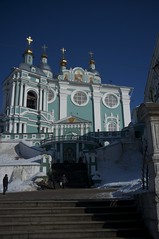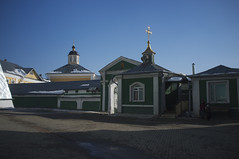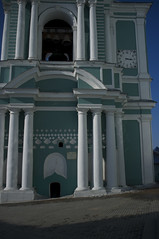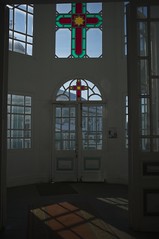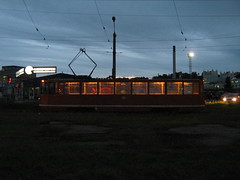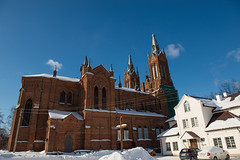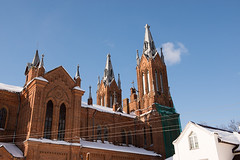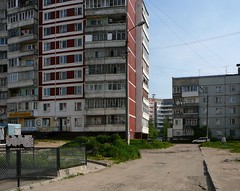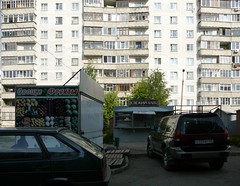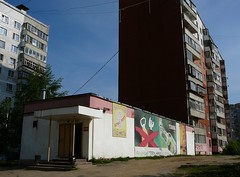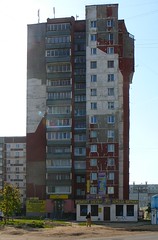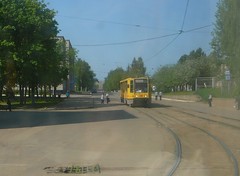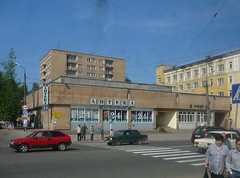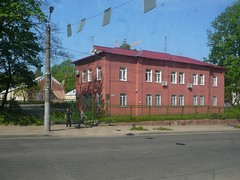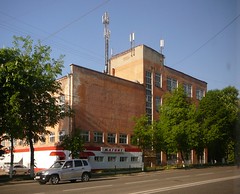Orsha
Orsha (Belarusian: О́рша; Russian: О́рша Russian: [ˈorʂə]; Lithuanian: Orša, Polish: Orsza) is a city in Vitebsk Region, Belarus, on the fork of the Dnieper and Arshytsa rivers. It serves as the administrative center of Orsha District.
History
Orsha was first mentioned in 1067 as Rsha, making it one of the oldest towns in Belarus. The town was named after the river, which was originally also named Rsha, probably from a Baltic root *rus 'slowly flowing.'
In 1320, Orsha became a part of the Grand Duchy of Lithuania. Between 1398–1407, the Orsha castle was built. On 8 September 1514 the famous Battle of Orsha occurred, between allied Grand Duchy of Lithuania with Kingdom of Poland and Muscovite army. The Muscovites suffered significant defeat; however, the victorious Grand Duchy of Lithuania did not fully avail its victory.
In 1555, Mikołaj "the Black" Radziwiłł founded a Calvinist (Protestant) order in Orsha, one of the first in the Belarusian lands. From the sixteenth to eighteenth centuries Orsha was a notable religious centre, with dozens of Orthodox, Protestant and Catholic churches and orders. The town was also home to a large Jewish population.
Orsha was granted Magdeburg Rights in 1620. In 1630, Spiridon Sobol opened the first printing house at the Kuciejna monastery, which became a well-known centre of Cyrillic-alphabet publishing. The town was damaged during the Russo-Polish War (1654-1667), which was a disaster for the Grand Duchy of Lithuania. During the First Polish partition the city was taken over by the Russian Empire in 1772, and became part of the Mogilyov Gubernia. Under Russian rule, it was stripped of its Magdeburg Rights in 1776 and went into cultural and economic decline. The population dropped sharply to just about 2,000 inhabitants. The city symbol in 1781 was changed to one which included the symbol of the Russian empire and five arrows.
In 1812, the city was badly burned during Napoleon's invasion. At the time of Orsha had been taken under control of French troops, there was a French writer Marie-Henri Beyle (also known under the pen name Stendhal) in a rank of intendant. According to the census of 1897, on a total population of 13,161, about 7,000 are Jews. During the First World War, the city was occupied by German forces in February–October 1918. From 2 February 1919, Orsha became a part of Homyel region (Vitebsk region, 1920) of Soviet Russia. After the formation of the Soviet Union, it was transferred to the Byelorussian SSR in 1924.
The population before World War II was about 37,000. The city was occupied by Germany on 16 July 1941. The occupiers founded several concentration camps in the city, where an estimated 19,000 people were killed.
Orsha was one of the centers of the Belarusian strikes in April 1991. Hundreds of thousands of coal miners had been on strike across the Soviet Union since March 1. On April 3, the day after the central government had imposed consumer price increases, workers at several Minsk factories walked out raising the miners' demand for wages indexed to inflation. Virtually the entire labor force of that city followed on the 4th, joined soon thereafter by strikes across the Belarusian SSR. Mass demonstrations voted for additional demands (including the dissolution of the Union and Belarusian governments and the end of the Communist Party's privileges) and elected delegates from each enterprise to citywide strike committees, which in turn sent representatives to a central Belarusian Strike Committee (SKB). On April 23, the SKB resumed the general strike after the deadline for its demands to be met had passed. The next morning, Gorbachev, Yeltsin, and leaders of eight of the other Soviet republics published a joint declaration in the papers agreeing to democratic elections for the Soviet parliament and the presidency, a new union treaty that would "radically increase the role of the union republics," and measures to soften the impact of the price increase, but also the introduction of a "special work regime" in many industries.
In response, the Orsha strike committee issued a proposal for all local workers to block the railway junction, strategically located on the line linking Moscow and Leningrad to Eastern and Western Europe. This was quickly endorsed by votes to "lie down on the rails" at a citywide meeting at the railway station. On the 25th, the Belarusian authorities concentrated the republic's KGB and riot police forces on Orsha, but were resisted by the strikers who sent fuel trains primed to explode down the tracks. Gorbachev mobilized the nearby military forces in Pskov with instructions to restore order over the railway; however many officers declared their refusal to comply, and brigade commander Gennady Sidorov professed a "lack of understanding" of the mission. Meanwhile, workers in other cities throughout Belarus held rallies threatening to retaliate if a drop of blood was shed in Orsha. Fearing a clash, and seizing on the government's offer to negotiate with its representatives and grant it radio and air time, the SKB suspended the general strike that evening.
Population change
- 16th-17th century: est. 5,000
- 1776: less than 2,000
- 1939: 37,000
- 1970: 100,000
- 2004: 125,000
Military
OSGOEINT reported on the 571st Aircraft Repair Plant (ARP) located at Orsha Airfield (Balbasovo Air Base). Accordingly, the 571st ARP repairs Mi-8-17 HIP, Mi-24-35 HIND, as well as the Tu-134 CRUSTY and possibly the IL-76 CANDID. The report goes on to mention recent investment agreements with Ukraine where private firms planned on providing $12 million to finance facility upgrades during the 2012-2016 period. Press reporting stated that the investors planned on building a modern warehouse terminal as well as office buildings for customs services, banking, and a leasing company.
Famous natives of Orsha
- Francis Dzierozynski, Jesuit
- Piotra Holub (Golub Petr Semionovich) (1913–1953), artist, author of many well-known Soviet propaganda posters, such as "Болтун находка для шпиона" and many others
- Uladzimir Karatkievich, Belarusian writer
- Mikhail Marynich, opposition politician, who was imprisoned in Orsha
- Georgy Mondzolevsky, 2-time Olympic volleyball champion
- Gershon Shufman, Hebrew author, known as 'Gimel Shufman'
- Frida Vigdorova, Soviet writer and journalist, famous for writing "White book" after Joseph Brodsky trial, in support of human rights in USSR
- Lev Vygotsky, psychologist
- Nathan Zarkhi (1900–1935), Soviet playwright and film writer
- Faina Chiang, became first lady of the Republic of China in 1978.
- Igor Zhelezovsky, Olympic medalist speed skater
- Alina Talay (born 1989), track and field athlete
- Vyacheslav Zarenkov (born 1951), Belarusian entrepreneur
- Some legends state that the unknown father of Belarusian president Alexander Lukashenko was a peasant from Orsha.
Twin towns – sister cities
Orsha is twinned with:
- Asha, Russia
- Bălți, Moldova
- Bondeno, Italy
- Cherkasy, Ukraine
- Dubna, Russia
- Gagarin, Russia
- Ivanovo, Russia
- Ivanteyevka, Russia
- Kardymovsky District, Russia
- Koptevo (Moscow), Russia
- Krasnogvardeysky (Saint Petersburg), Russia
- Mārupe, Latvia
- Pernik, Bulgaria
- Pushkin, Russia
- Qingdao, China
- Shishou, China
- Silifke, Turkey
- Smolensk, Russia
- Spitak, Armenia
- Telšiai, Lithuania
- Tver, Russia
- Vaulx-en-Velin, France
- Volgodonsk, Russia
- Vyazma, Russia
- Yiwu, China
- Zapadnoye Degunino (Moscow), Russia
External links
Looking for places related to Orsha?
Those are other destinations to find places related to Orsha:


